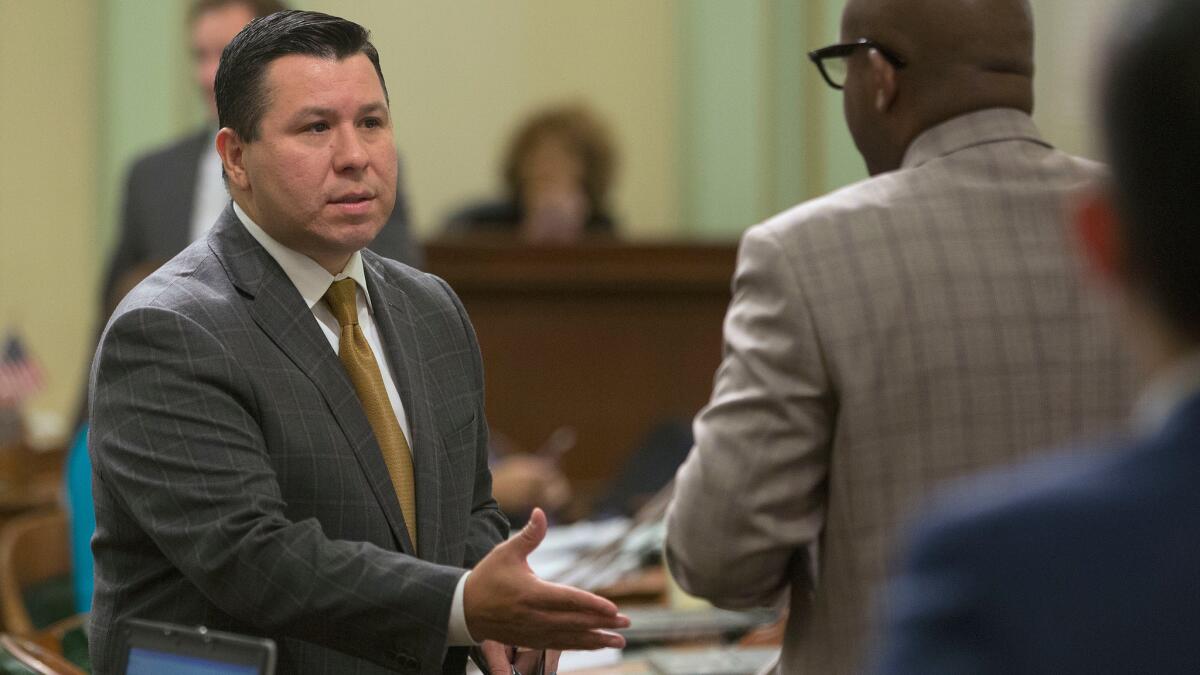‘An exercise in threading the needle’: Lawmakers perform balancing act to move climate legislation forward

- Share via
In this year’s debate over California climate policy, much of the attention has centered on a proposal to extend and expand the state’s mandate for reducing greenhouse gas emissions.
But it’s another piece of legislation that’s generating the most drama, becoming the focus of an intense political tug of war over who controls the next era of environmental regulation and which communities will benefit.
The measure, Assembly Bill 197, would boost legislative oversight of the state’s leading climate regulator, the California Air Resources Board, and would require the agency to focus more attention on cutting emissions from local refineries and manufacturers.
By combining the two proposals in one bill, Assemblyman Eduardo Garcia (D-Coachella) and his allies are attempting a delicate balancing act concerning issues that have divided lawmakers for years.
The goal is to assuage lawmakers who bristle at plans to continue empowering regulators and remain skeptical about whether policies to tackle a global problem are having a positive impact in their constituents’ backyards.
Backers of the legislation hope to avoid antagonizing Gov. Jerry Brown, who has carefully defended his administration’s authority to act independently, while deflecting opposition from oil companies and manufacturers that have found a sympathetic ear with some Democrats.
“It is an exercise in threading the needle,” said Alex Jackson, a San Francisco-based lawyer for the Natural Resources Defense Council.
The measure was approved 23 to 13 by the state Senate on Monday; its next stop is the Assembly, where a tougher battle is expected. The legislative session ends Aug. 31, and Brown and top lawmakers have been locked in negotiations.
The issue provides a high-profile role for Garcia that comes after the freshman lawmaker joined some of his colleagues at the United Nations conference on climate change in Paris in December.
Keep track of the major issues the Legislature is considering this month »
A Latino representative of a low-income, inland district running from Joshua Tree National Park to the border with Mexico, Garcia said he wants to ensure environmental policies are benefiting California communities.
His legislation is part of a package with Senate Bill 32, which would require the state to reduce greenhouse gas emissions to 40% below 1990 levels by 2030. The current target is reaching 1990 levels by 2020, a goal the state is on track to meet.
By comparison, Garciabelieves his bill addresses nuts-and-bolts questions about how the state would meet its goals, and how they would affect residents.
“It’s great to hear about saving polar bears and hugging trees, and making sure we address global warming from a world perspective,” he said. “But how about people?”
The bill would require the Air Resources Board to prioritize on emissions reductions from facilities such as refineries and other sources, a direct approach intended to create more local benefits in polluted areas.
The proposal reflects a distaste among some environmental advocates for the state’s cap-and-trade program. Though the program creates a financial incentive to slash emissions by forcing large companies to buy permits to pollute, environmental advocates are frustrated because the companies can continue to release greenhouse gases up to a certain amount as long as they pay the price.
They also dislike that companies can support carbon-reducing “offsets” in other states — projects such as forest preservation or capturing methane — instead of cutting local emissions, especially in places where children suffer from higher asthma rates.
“We want to see California climate policy have win-win benefits, good for public health, good for local air quality,” said Amy Vanderwarker, co-director of the California Environmental Justice Alliance, a coalition of local groups.

Requirements for direct emissions reductions are fiercely opposed by the Western States Petroleum Assn. and the California Manufacturers & Technology Assn., organizations that prefer a market-based system such as cap-and-trade.
“If we pick and choose the most expensive approaches, we won’t meet our goals,” said Dorothy Rothrock, president of the manufacturing group.
Mary Nichols, chairwoman of the Air Resources Board, defended the state’s current programs during a recent conference in Sacramento, disputing concerns that they don’t do enough to help poor Californians or are too onerous for businesses.
“Somehow it feels to me as though that we’ve come up with a pretty good mix,” she said.
Nichols also said she wants her agency to maintain its independence, despite the extra oversight sought by lawmakers. The state’s 2006 landmark climate law, AB 32, set a target for reducing emissions but gave significant leeway to regulators in figuring out how to get there.
“I think the genius of our effort has been that the Legislature was willing to allow the administration to come up with the gritty details of the program, and to be a little bit flexible and experimental about these things, knowing that if we screw up in some way, we can fix it,” she said. “I think that’s what we need to continue to do.”
A new crop of lawmakers who face looser term limits than their predecessors see an opportunity to claw back some authority.
Garcia’s measure would create a new, permanent legislative committee to oversee the Air Resources Board, which would be required to provide more detailed information on emissions reductions and what areas of the state were making progress. In addition, board members would be appointed to six-year terms, requiring them to receive another stamp of approval from lawmakers to continue serving.
Some lawmakers still want more authority, such as the chance to approve any regulations devised by the administration before they take effect.
“Just because we could hold a hearing, that’s one thing,” said Assemblyman Rudy Salas (D-Bakersfield). “But to actually be able to control the outcomes is something else.”
Assemblyman Jim Cooper (D-Elk Grove) called Garcia’s bill a “great start” but that he’s not sure it “goes far enough.”
Environmentalists have often grumbled that concerns about oversight are only an excuse for some lawmakers to oppose legislation disliked by powerful oil companies. For example, a recent request from Assemblyman Adam Gray (D-Merced) to audit the Air Resources Board was actually written by an oil lobbyist.
Jackson, the lawyer from the Natural Resources Defense Council, said AB 197 is the kind of compromise some Democrats say they’ve been waiting for.
“A lot of lawmakers have expressed reticence for voting on climate policies over concerns about oversight and concerns about benefits to their districts,” he said. “Let’s put those assertions to the test. Here’s a chance for members to take control over the future of California’s climate initiatives.”
[email protected], [email protected]
Twitter: @chrismegerian; @melmason
ALSO
A big question complicating the climate debate: Are current policies only benefiting the rich?
California’s cap-and-trade program faces daunting hurdles to avoid collapse
Updates on California politics
Updates from the campaign trail
UPDATES:
6:40 p.m.: This article was updated with details about the bill’s passage in the state Senate Monday.
This article was originally published at 1 p.m.
More to Read
Get the L.A. Times Politics newsletter
Deeply reported insights into legislation, politics and policy from Sacramento, Washington and beyond. In your inbox three times per week.
You may occasionally receive promotional content from the Los Angeles Times.









